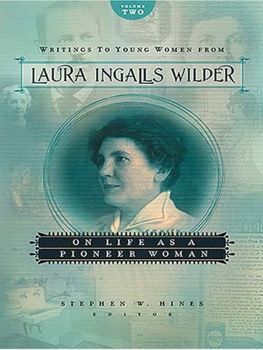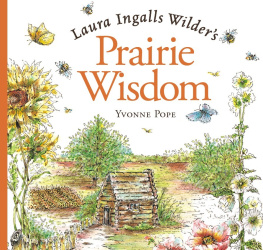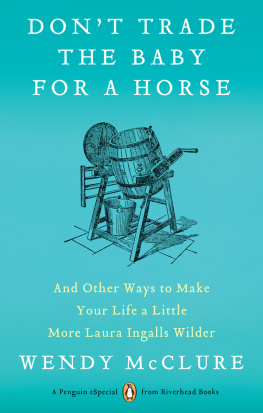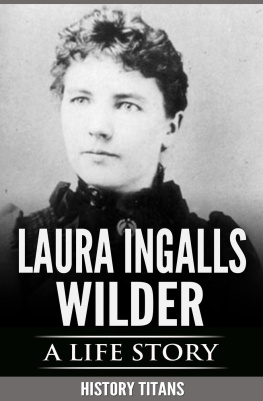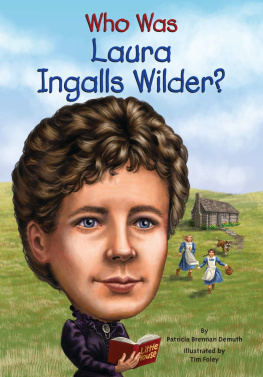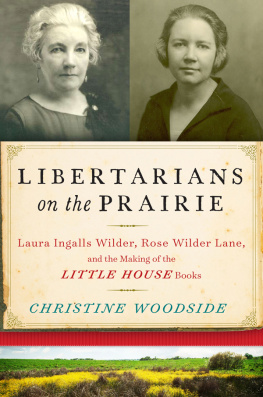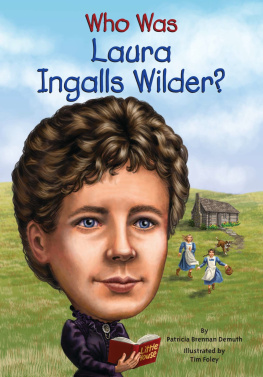WRITINGS TO YOUNG WOMEN FROM
LAURA INGALLS WILDER
ON LIFE AS A PIONEER WOMAN
VOLUME TWO
VOLUME ONE
Writings to Young Women from Laura Ingalls Wilder:
On Wisdom and Virtues
VOLUME TWO
Writings to Young Women from Laura Ingalls Wilder:
On Life as a Pioneer Woman
VOLUME THREE
Writings to Young Women on Laura Ingalls Wilder:
As Told by Her Family, Friends, and Neighbors
WRITINGS TO YOUNG WOMEN FROM
LAURA INGALLS WILDER
ON LIFE AS A PIONEER WOMAN
VOLUME TWO
Laura Ingalls Wilder
Edited by Stephen W. Hines

Writings to Young Women from Laura Ingalls Wilder:
On Life as a Pioneer Woman
Volume Two
Adapted from Little House in the Ozarks
Copyright 2006 by Stephen W. Hines
Cover design by Lookout Design, Inc.
All rights reserved. No portion of this book may be reproduced in any form without the written permission of the publisher, with the exception of brief excerpts in reviews.
Published in Nashville, Tennessee, by Tommy Nelson, a Division of Thomas Nelson, Inc. Visit us on the Web at www.tommynelson.com.
Tommy Nelson books may be purchased in bulk for educational, business, fund-raising, or sales promotional use. For information, please e-mail:
SpecialMarkets@ThomasNelson.com.
Scripture quotations are taken from The Holy Bible, King James Version.
This book is not in any way sponsored by or affiliated with HarperCollins Publishers, which claims the exclusive right to use the words Little House as a trademark. Our use of these words simply and truthfully brings to you the warm personal facts about Laura Ingalls Wilder, Americas beloved author, and about her life, times, and beliefs.
Cover photograph credits: Lauras profile (Herbert Hoover Presidential Library), Almanzo, Jell-O Advertisement (The Kansas State Historical Society), Laura (The Kansas State Historical Society), Maytag Advertisement (The Kansas State Historical Society), Karo Advertisement (The Kansas State Historical Society), Lauras kitchen (Herbert Hoover Presidential Library), Lauras window seat (Herbert Hoover Presidential Library), Laura (Herbert Hoover Presidential Library).
Library of Congress Cataloging-in-Publication Data
Wilder, Laura Ingalls, 1867-1957.
[Prose works. Selections]
Writings to young women from Laura Ingalls Wilder / Laura Ingalls Wilder ; edited
by Stephen W. Hines.
p. cm.
ISBN 1-4003-0785-6 (On Life as A Pioneer Woman, Volume Two)
1. Young womenConduct of life. I. Hines, Stephen W. II. Title.
PS3545.I342A6 2006
814.52dc22
2005033723
Printed in the United States of America
06 07 08 09 10 WRZ 9 8 7 6 5 4 3 2 1
CONTENTS
T he way people live today has changed so much from the way people lived when the western part of the United States was settledfrom approximately 1850 to 1890that it is hard to present the reality of pioneer life in contrast to life today.
Not only were there no cars and airplanes back then but also there was virtually no such thing as prepackaged food, except for some kinds of hard candy and crackers. Grocery stores, or general stores as they were more commonly called, had great wooden barrels of flour, sugar, molasses, and the like.
Meat came freshly cut or was hunted and killed by the pioneers themselves. To have fried chicken was a special treat that involved killing the chicken, dipping it in scalding hot water, plucking the feathers off, and then holding it over a flame to singe any remaining feathers. The smell of doing this was pungent; you definitely knew your food came from a living animal. Store-bought chicken today often looks as though it was manufactured in a factory, and we dont have to experience the strong smells from preparing it.
Just as preparing food was different, travel was also different and took more time and effort. People traveled very little compared to how much we do now. Ten miles was a long distance for a pioneer. A man driving a wagon might take half a day to go that far; then if he had to come back in the same day, he barely made it home by sundown. By comparison, we can drive ten miles in ten minutes easily!
Horses and donkeys or mules required constant care, shelter, and feed. Caring for such animals was almost a full-time job in itself. Of course, a car requires care, too, but it doesnt eat all the time and smell bad or attract flies.
Yet there were things that made up for the hardships of the old days. When people did finally have time to gather and visit, there were no distractions by way of television, radio, video games, or even record players. People actually talked to one another, and this led to closer relationships and stronger community ties. People relied on one another and were willing to help their neighbors in times of need.
It was not unusual for farmers and their wives to trade work. If a farmer needed to put up a barn, and most of them did, the farmers friends would lend a hand, and the barn would be put up in a few days. No money actually changed hands for the work, because they were going to help others put their own barns up, or they might help in harvesting a crop.
Women would have workings where they helped each other harvest vegetables from the garden, mostly beans and peas. They would sit and shell peas or snap green beans and talk. Very strong friendships formed in this environment where entertainment was limited and the work constant.
Even children did a lot of work. Boys began working with their fathers to learn whatever skills their fathers had, and girls went into training early with their mothers to learn how to be good homemakers. Education was limited for most pioneer children but offered opportunities to get the basics in reading, writing, and arithmetic.
Play was one of the big benefits of going to school back then. At recess, students trooped outside to play games of tag and baseball. Recess took place sometimes three times a day. When the weather was bad, students could entertain themselves by playing tic-tac-toe and checkers inside.
Reading was also an important pastime, and newspapers and magazines were saved and traded between family and friends. Childrens books were popular back then, just as they are today. Only there were fewer books, and good books were treasures that were passed down from generation to generation.
Laura Ingalls Wilder lived long enough to see the dawn of the rocket age, and she was excited about progress and modern inventions, but she never felt these things replaced the traditional moral values of her pioneer days. She said: Across the years, the old home and its love called to me, and memories of sweet words of counsel came flooding back.... Strength to the good will not come from the modern improvements... but from the quiet moments and the still small voices of the old home.
External things have changed a lot since pioneer times, but as people we are not that different from the pioneers of Lauras day.
Stephen W. Hines
Editor
F irst of all, I would like to acknowledge the invaluable aid of my wife, Gwendolyn Joy Hines, in this undertaking. Her persistence in proofreading, titling of articles, and all-around general good advice made this project flow much more smoothly than it would have otherwise.
And my thanks to:
Gordon R. Cuany for obtaining material for me through interlibrary loan.
Jackie Dana for her determined research efforts at the Ellis Library of the University of Missouri at Columbia, Missouri.
Patricia Timberlake, June DeWeese, Margaret Howell, Laurel Boeckman, and Marie Concannon, librarians at the Ellis Library, who answered my questions and allowed me to review highly fragile material.
Next page
